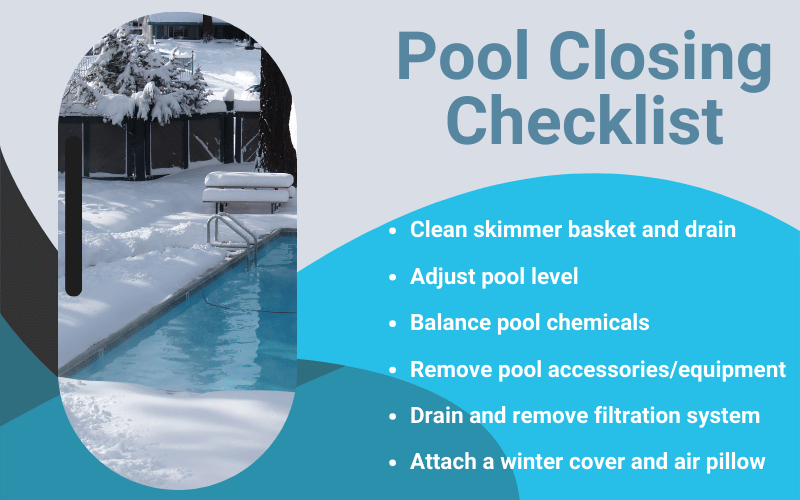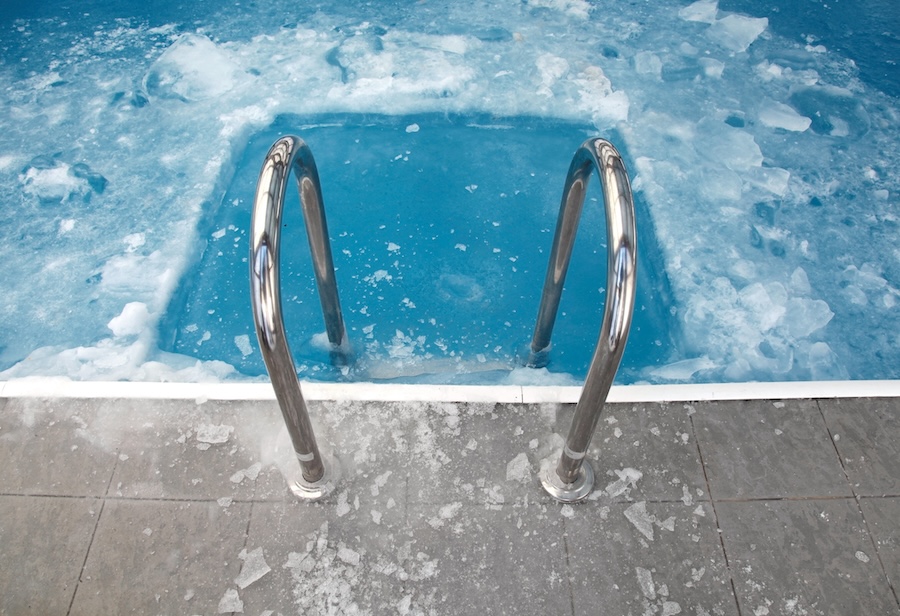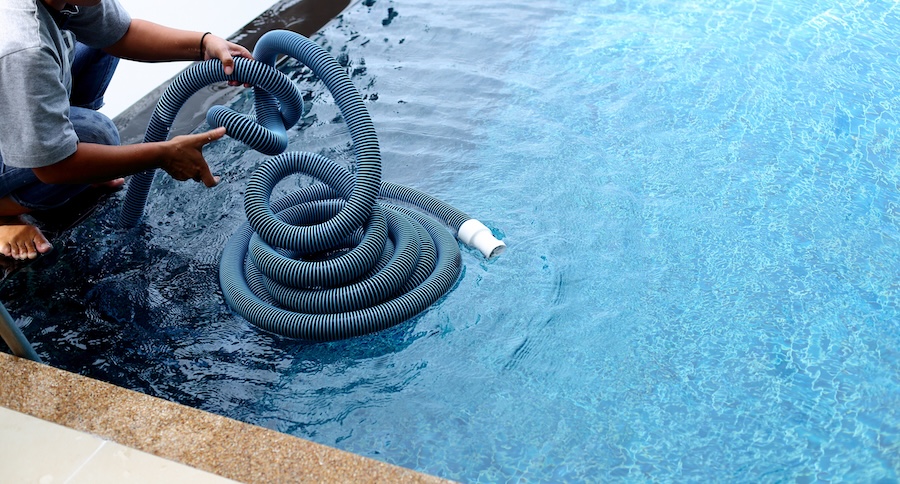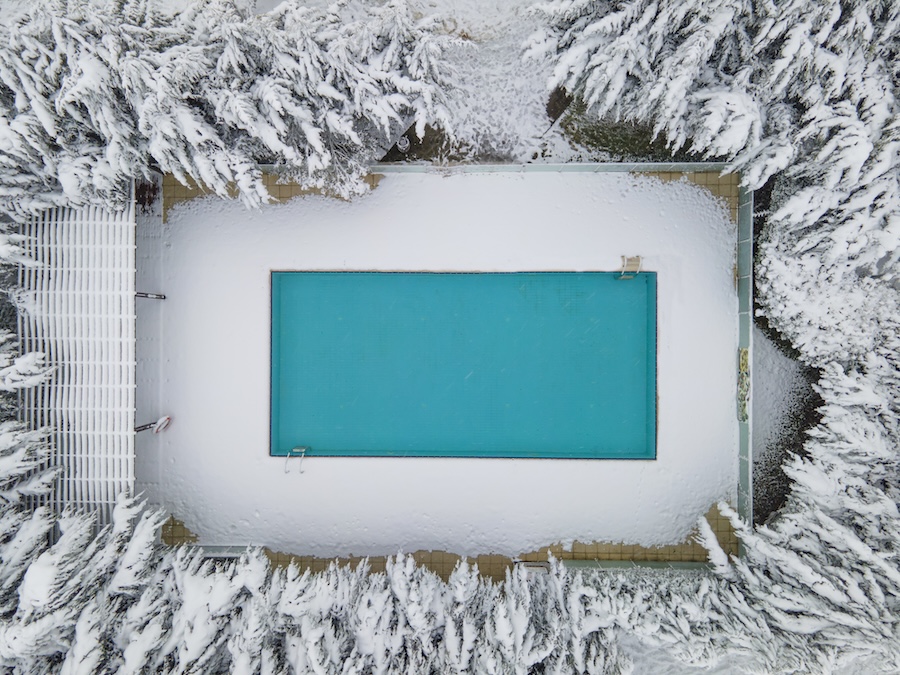Winterizing your pool is an essential step in protecting your investment and ensuring your pool is ready to reopen when warmer weather returns. Here’s why taking the time to properly close your pool for the winter season is so important.
Prevents Potential Issues
Freezing temperatures during the winter months can wreak havoc on your pool’s liner, pipes, and pool equipment. If water is left in your filtration system, pool pump, or skimmer basket, it can freeze and expand, causing cracks or bursts that require costly repairs. Using tools like an air pillow or expansion plug can help protect your pool surfaces, including the vinyl liner or fiberglass shell, from damage due to ice pressure.
Draining the water level to the correct height and ensuring the main drain is clear of water with a submersible pump further prevents damage from snow melt or freezing conditions.
Another step in a proper pool winterizing process is balancing the pool’s water chemistry. This includes adding different pool chemicals like chlorine and shock to make sure the alkalinity, ph, and other elements are at the proper level. These steps help prevent algae growth that thrives in unbalanced water and can be difficult to remove when the pool is reopened.
Saves You Money in the Long Run
Investing in a professional to close your pool, or pool closing kit, winter cover, and other pool accessories might seem like an upfront expense, but it can save you considerable money in the long run. By protecting your pool equipment from freezing and keeping the water level and water chemistry balanced, you avoid costly repairs and excessive chemical treatments. Properly winterized pools also experience less wear on the vinyl liner, fiberglass pool surfaces, or other structural elements, prolonging the life of your pool.

Steps to Close Your Pool for Winter
Follow these essential steps to properly close your pool for the winter season, ensuring your pool stays in top shape through freezing temperatures:
Clear and Clean the Skimmer Basket and Main Drain
Remove all debris from the skimmer basket and ensure the main drain is clear of any remaining water. Using a submersible pump can help drain water from the pipes, reducing the risk of freezing damage to pool equipment.
Adjust the Pool Water Level and Check Water Chemistry
Lower the pool water level below the skimmer and return lines to prevent ice expansion damage. Test the water chemistry and balance it properly:
-
- pH: 7.2 – 7.8
- Alkalinity: 125-170 ppm (for vinyl pools)
- Calcium Hardness: 200-400 ppmUse an Oxidizing Shock and Balance Pool Chemicals
Add a non-chlorine, or oxiding shock to sanitize the remaining water and prevent algae growth. Using a non-chlorine shock is preferable since it doesn’t break down as quickly, making sure your pool chemicals stay balanced through the winter.
Remove Pool Accessories and Equipment
Take out all pool accessories, such as ladders, handrails, and toys. Disconnect pool equipment, including the pool pump, filter pump, and pool heater, and store them in a safe, dry place to protect them from freezing temperatures.
Drain and Remove the Filtration System and Pool Pump
Drain the filtration system and pool pump completely, including removing the drain plug and expansion plug, to avoid damage caused by ice or snow melt.
Utilize a Winter Cover and Air Pillow
Install a high-quality winter cover and an air pillow for above-ground pools or in-ground pools to prevent debris accumulation and ice formation. The air pillow helps distribute pressure from freezing water evenly, protecting the pool liner or fiberglass pool surfaces.
By following this step-by-step guide, pool owners can effectively safeguard their swimming pool, whether it’s an inground pool, above-ground pool, or fiberglass pool, and be prepared for a hassle-free reopening when winter temperatures give way to warmer days.

Winter Pool Closing Challenges
While closing your pool is essential for protecting it during the winter season, there are several challenges that pool owners may face during the process:
Properly Balancing Water Chemistry
Ensuring the pool water stays algae-free all winter requires precise water chemistry adjustments. Factors such as chlorine levels, pH, and alkalinity must be perfectly balanced, as even slight miscalculations can lead to algae growth and cloudy water by the time you reopen the pool. Maintaining this balance during fluctuating winter temperatures can be particularly tricky.
Blowing Out the Filtration and Pump System
Draining and properly blowing out the filtration system and pool pump to remove all remaining water is both time-consuming and critical. Any water left behind in pipes or equipment can freeze, expand, and cause cracks or severe damage. This step, while crucial, often requires professional equipment and expertise to execute effectively, especially for inground pool systems.
Frustrating and Expensive Consequences of Mistakes
Mistakes during the pool closing process can result in costly repairs. For example, improperly installed winter covers may allow debris or snow melt to enter the pool, leading to algae growth and damage to the pool surfaces. Failing to secure drain plugs or expansion plugs correctly can result in frozen pipes or damaged pool equipment, adding stress and unexpected expenses when it’s time to reopen the pool.

How Net Positive Pools Can Help
Closing your pool for the winter can be a challenging task, but relying on a professional pool company like Net Positive Pools makes the process easier, safer, and more efficient. We offer a variety of professional services tailored to meet the unique needs of pool owners. These include:
- Pool closing services
- Pool opening services
- Salt cell cleaning
- Weekly maintenance programs
- Pool liner installation and repair
- And more!
Our team ensures every step of pool care is handled with precision, from balancing water chemistry to installing or repairing liners, so your pool remains in top condition year-round.
Peace of Mind During Winter Months
By entrusting your pool closing to professionals, you can be confident that all necessary steps are taken to protect your pool during the winter. This proactive approach helps prevent potential issues like freezing damage or algae growth, ultimately saving you time and money when reopening your pool in the spring.
For a safe and secure pool during the winter months, consider seeking professional advice and services from Net Positive Pools. Our commitment to excellence and customer satisfaction makes us a trusted partner in pool maintenance and care. Contact us today to safely close your pool this winter!
Resources:
https://netpositivepools.com/blog/how-to-lower-alkalinity-in-pool/
https://www.taylortechnologies.com/it/page/169/understanding-calcium-hardness


